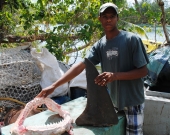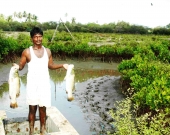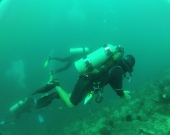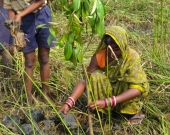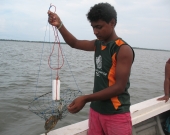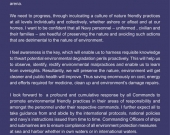Newsroom :: Newsletter :: MFF Newsletter 28
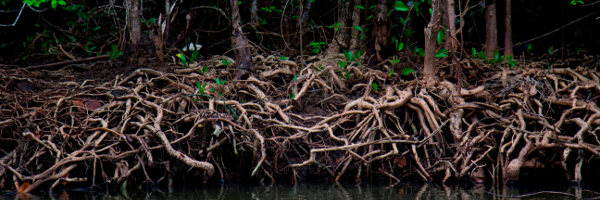
|
Mangroves for the Future Newsletter - Issue 28
Welcome !
This edition of the MFF newsletter invites you to take look at some of the MFF projects that demonstrate 'local solutions to global challenges' facing coastal and marine ecosystems.
Many coastal regions in Asia continue to face the challenge of mangrove ecosystem degradation and destruction brought about by the conversion of mangrove forests to shrimp farms, adopting monoculture practices, and excessive use of artificial feed. A MFF project in India responded to this issue by introducing mangrove based farming system based on poly culture practices, which helped increase land productivity and local economy. MFF believes that scalable and replicable approaches like these that hinge on ecosystem based adaptation (EBA) measures can be locally tailored in responding to similar problems throughout the region and potentially in other parts of the world also.
Likewise in the Seychelles MFF supported the development of a National Action Plan and Shark Identification Key that reduces pressure on 'non target species' and supports the monitoring of efforts for better fisheries management. In addition to addressing the problem of local over exploitation of shark populations, this project is also relevant to the current international attention on trade regulations raised at the recent CITES conference at which decisive action was taken to halt decline of shark species.
Being a partnership-based initiative, MFF puts a strong focus on building effective networks to address and solve coastal issues. A unique partnership has emerged in Pakistan whereby MFF engages the Pakistan Navy and provides inputs to their conservation practices in naval operations. The project under this partnership has reached out to nearly 12000 participants from various Pakistan Navy operated institutions through environmental sensitization activities. Following this engagement, a set of directives were issued by the Naval Chief for compliance of environmentally friendly practices and guidelines to address pollution related problems in coastal and marine areas of Pakistan.
There is a pressing need for qualified coastal managers and practitioners in the region. During the 3rd MFF Postgraduate Certificate Course on Integrated Coastal Management (ICM) held from 21 January to 1 March 2013, twenty-seven participants from ten countries across Asia were trained in the theory and practice of ICM. Upon return to their respective countries, participants apply their newly-acquired ICM knowledge in their respective host institutions -and in the process new know-how is shared among their coastal management peers.
MFF launched two regional projects this quarter under the Regional Grants Facility. One of these projects is focusing on mapping the governance structures in small islands and will be implemented in the Seychelles, Sri Lanka, Maldives and Thailand. The other project introduces the "Green Fins" approach in the Maldives and Vietnam to curb the negative impacts of recreational diving on marine ecosystems.
MFF is also organizing a regional training course on mangrove restoration and management (Thailand) from 22-30 June and a marine spatial mapping training (Viet Nam) from 30-31 May. For more details on these events please log on to our website.
As always, we hope you find the contents of this edition of our newsletter insightful and informative. Do check our news links below for more stories on MFF's activities.
Visit our website www.mangrovesforthefuture.org and our Facebook page .. and spread the good word!
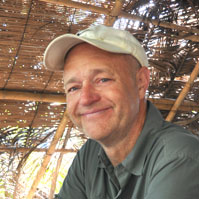
Steen Christensen
Coordinator
Mangroves For The Future
MFF online survey
Please take a short online survey to help make the MFF newsletter better: Take Survey
Regional Activities
Sustainable shark fishing in the Seychelles
04 Apr 2013
In a landmark decision to save sharks from extinction, countries from around the world voted at the 16th meeting of the Convention on International Trade in Endangered Species (CITES) to regulate international trade in the Oceanic White tip, hammerhead and several other shark species. While this decision helps regulate imports to consuming market countries, sustainable use will not be achieved unless regulatory capacity in shark exporting countries is improved.
Natural Shrimp Farms
03 Apr 2013
In the early 1990s in India, intensive chemical input based shrimp production became very popular. Over time, the proliferation of monoculture, disease, poor seed quality, excessive use of artificial feed, poor environmental management, increased input costs and decreased market returns contributed to a wide-scale collapse of aquaculture production. Consequently large areas of coastal land were abandoned. As the land was too saline to be returned to its original agricultural use, and local farmers were left destitute.
MFF, UNEP launch Green Fins approach for Maldives and Viet Nam reefs
Puerto Galera, Philippines 12 Mar 2013
MFF and UNEP launch "Green Fins" as an approach to address threats posed by recreational scuba diving-related activities. The Green Fins approach works with dive centres to establish a network of educated dive operators and divers, to promote a set of standards for environmentally sustainable scuba diving tourism activities.The 2-year project will be implemented in MFF countries Maldives and Vietnam, which have extensive and highly diverse coral reefs.
Country Updates
Working with fisherwomen in Xuan Thuy National Park
Xuan Thuy National Park, Viet Nam 22 Mar 2013
Every day, hundreds of local fisherwomen enter the mangrove forest in Xuan Thuy National Park to collect shells, mollusks, crabs, and other aquatic products. Although the law prohibits any kind of resource extraction in the core zone, the poor women who depend on these natural resources have no other choice.
Community actions call for sound coastal investment
Port Glaud, Mahe, Seychelles
Sustainability for Seychelles (S4S), a national non-governmental organisation, prompted the community of Port Glaud to react towards the development of a Five Star resort within their small but diverse community. The Constance Ephelia Resort sits in between two very important ecological systems in the Port Glaud district situated on the Western coast of the Seychelles main island of Mahe.
Women in Bhitarkanika join the crusade to save mangroves!
Orissa, India 22 Mar 2013
The Bhitarkanika mangrove sanctuary is the life force for the majority of coastal communities living in the Kendrapara district of Orissa, India. Although the sanctuary serves to protect fundamental ecosystem services and diversity, several communities in the region feel disassociated from the mangroves on which they directly and indirectly depended on for their lives and livelihoods. This has forced them, to now rely on the degraded mangroves on the fringe of the sanctuary. When necessary the communities illegally fish or extract wood and other resources from within the sanctuary. Amongst the most vulnerable of the sections of communities to be affected by this state of affairs are women folk in these villages
Coastal Sustainability: Learnings from MFF India projects
New Delhi, India 20 Sep 2012
Many of us will never have to stand at lands end, watching the incoming tide, and wonder how to feed and protect our families. But more than 20 million people in India, living along its coasts and depending on a delicate balance between ocean and land ecologies, are doing exactly that today.
Reintroduction of traditional crab traps increases income of fishers in Kokilai Lagoon, Sri Lanka
Kokilai, Sri Lanka 22 Mar 2013
Use of traditional traps have reduced wastage of fishery resources and by-catch. Selective harvest facilitated by traps enables the fishermen to throw the under-weight and gravid crabs back to the lagoon.
Safeguarding Pakistan's Coastal & Marine Resources
Pakistan 22 Mar 2013
Awareness of different stakeholders is an important element in the process leading to achievement of objectives of integrated coastal management. The unique engagement of Pakistan Navy in creation of awareness among their ranks through a MFF grant has been one of the significant steps by a security agency towards promoting collaborative action to address the challenges of coastal resources management.
